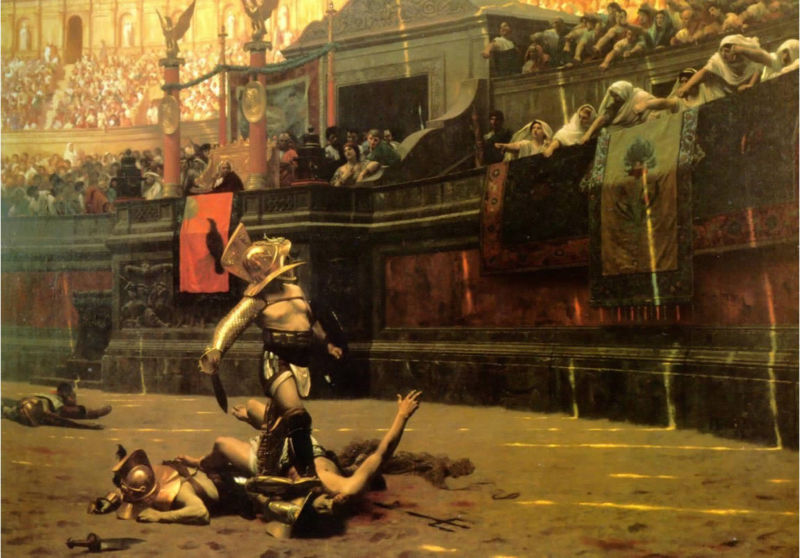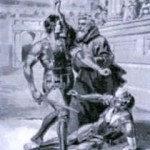The Man Who Stopped the Roman Gladiator Fights – Faith Stories You Won’t Forget Series

This is the remarkable story of one man, a monk named Telemachus, whose revulsion by the senseless violence of the Roman gladiator fights-to-the-death led to the end of this brutal practice – at the cost of his own life.
There are some differences in the details of various versions of the historical writings on the subject but they all agree that is was Telemachus’ courageous intervention that brought an end to the gladiator fights.
The story as written in Fox’s Book of Martyrs is as follows:
After this fortunate victory over the Goths a “triumph,” as it was called, was celebrated at Rome. For hundreds of years successful generals had been awarded this great honor on their return from a victorious campaign. Upon such occasions the city was given up for days to the marching of troops laden with spoils, and who dragged after them prisoners of war, among whom were often captive kings and conquered generals. This was to be the last Roman triumph, for it celebrated the last Roman victory. Although it had been won by Stilicho, the general, it was the boy emperor, Honorius, who took the credit, entering Rome in the car of victory, and driving to the Capitol amid the shouts of the populace. Afterward, as was customary on such occasions, there were bloody combats in the Colosseum, where gladiators, armed with swords and spears, fought as furiously as if they were on the field of battle.
The first part of the bloody entertainment was finished; the bodies of the dead were dragged off with hooks, and the reddened sand covered with a fresh, clean layer. After this had been done the gates in the wall of the arena were thrown open, and a number of tall, well-formed men in the prime of youth and strength came forward. Some carried swords, others three-pronged spears and nets. They marched once around the walls, and stopping before the emperor, held up their weapons at arm’s length, and with one voice sounded out their greeting, Ave, Caesar, morituri te salutant! “Hail, Caesar, those about to die salute thee!”
The combats now began again; the glatiators with nets tried to entangle those with swords, and when they succeeded mercilessly stabbed their antagonists to death with the three-pronged spear. When a glatiator had wounded his adversary, and had him lying helpless at his feet, he looked up at the eager faces of the spectators, and cried out, Hoc habet! “He has it!” and awaited the pleasure of the audience to kill or spare.
If the spectators held out their hands toward him, with thumbs upward, the defeated man was taken away, to recover if possible from his wounds. But if the fatal signal of “thumbs down” was given, the conquered was to be slain; and if he showed any reluctance to present his neck for the death blow, there was a scornful shout from the galleries, Recipe ferrum! “Receive the steel!” Privileged persons among the audience would even descend into the arena, to better witness the death agonies of some unusually brave victim, before his corpse was dragged out at the death gate.
The show went on; many had been slain, and the people, madly excited by the desperate bravery of those who continued to fight, shouted their applause. But suddenly there was an interruption. A rudely clad, robed figure appeared for a moment among the audience, and then boldly leaped down into the arena. He was seen to be a man of rough but imposing presence, bareheaded and with sun-browned face. Without hesitating an instant he advanced upon two gladiators engaged in a life-and-death struggle, and laying his hand upon one of them sternly reproved him for shedding innocent blood, and then, turning toward the thousands of angry faces ranged around him, called upon them in a solemn, deep-toned voice which resounded through the deep inclosure. These were his words: “Do not requite God’s mercy in turning away the swords of your enemies by murdering each other!”
Angry shouts and cries at once drowned his voice: “This is no place for preaching!–the old customs of Rome must be observed!–On, gladiators!” Thrusting aside the stranger, the gladiators would have again attacked each other, but the man stood between, holding them apart, and trying in vain to be heard. “Sedition! sedition! down with him!” was then the cry; and the gladiators, enraged at the interference of an outsider with their chosen vocation, at once stabbed him to death. Stones, or whatever missiles came to hand, also rained down upon him from the furious people, and thus he perished, in the midst of the arena.
His dress showed him to be one of the hermits who vowed themselves to a holy life of prayer and self-denial, and who were reverenced by even the thoughtless and combat-loving Romans. The few who knew him told how he had come from the wilds of Asia on a pilgrimage, to visit the churches and keep his Christmas at Rome; they knew he was a holy man, and that his name was Telemachus-no more. His spirit had been stirred by the sight of thousands flocking to see men slaughter one another, and in his simple-hearted zeal he had tried to convince them of the cruelty and wickedness of their conduct. He had died, but not in vain. His work was accomplished at the moment he was struck down, for the shock of such a death before their eyes turned the hearts of the people: they saw the hideous aspects of the favorite vice to which they had blindly surrendered themselves; and from the day Telemachus fell dead in the Colosseum, no other fight of gladiators was ever held there.
Faith Stories You Won’t Forget Series focuses primarily on heroes and heroines of the Christian faith. This is the third post in the series. You can see the other posts at:
Faith Stories You Won’t Forget Series – Amy Carmichael
Faith Stories You Won’t Forget Series – William Tyndale
Etc.
Please use the Share Buttons and/or email the post link below directly to your friends. This is a story worth sharing.
The Man Who Stopped the Roman Gladiator Fights – Faith Stories You Won’t Forget Series
Thanks. I appreciate it. – Dick S.


